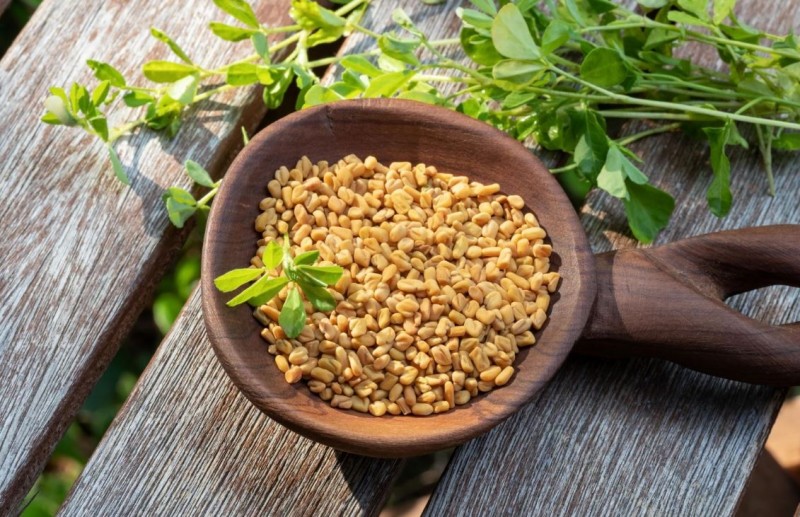
Fenugreek seeds, commonly known as methi dana, are not only beneficial for health but also for hair. This easily accessible ingredient is rich in fiber, and incorporating it into your diet can transform its taste. Applying fenugreek seeds to the hair is believed to strengthen and nourish the hair. However, it's essential to be cautious, as fenugreek may not be suitable for everyone.
1. High Blood Pressure Issues:
Fenugreek seeds, known for their rich nutritional profile, might not be suitable for individuals dealing with high blood pressure problems. Despite their numerous health benefits, fenugreek seeds have properties that can impact blood pressure levels. The seeds contain compounds that may affect blood clotting and increase the risk of bleeding, which can be particularly problematic for those with hypertension.
Additionally, fenugreek seeds are known to have a warming effect on the body. This warming property may lead to an increase in heart rate and blood pressure. For individuals already struggling with hypertension, this could exacerbate their condition and potentially lead to adverse cardiovascular events. Therefore, it is advisable for individuals with high blood pressure issues to avoid the consumption of fenugreek seeds and consult with a healthcare professional for personalized advice.
2. Breathing Difficulties:
Another group that should exercise caution when it comes to fenugreek consumption is individuals experiencing difficulties in breathing. Fenugreek seeds, when ingested, may trigger respiratory issues in susceptible individuals. The seeds can produce certain compounds that may irritate the respiratory tract, leading to coughing, wheezing, or shortness of breath.
Individuals with pre-existing respiratory conditions such as asthma or chronic obstructive pulmonary disease (COPD) should be particularly careful. The inhalation of fenugreek powder or seeds may worsen their symptoms and contribute to respiratory distress. It is recommended that individuals with breathing difficulties refrain from consuming fenugreek and seek medical advice if necessary.
3. Pregnant Women:
While fenugreek is generally considered safe for consumption, pregnant women should approach it with caution. The warming nature of fenugreek can potentially stimulate the uterus and lead to an increase in blood flow, which may pose a risk of bleeding-related complications during pregnancy. Moreover, fenugreek seeds are known to have emmenagogue properties, meaning they can stimulate menstrual flow.
Pregnant women are often advised to avoid substances that can potentially impact the pregnancy, and fenugreek falls into this category. It is crucial for expectant mothers to consult with their healthcare provider before incorporating fenugreek into their diet or using it for medicinal purposes. Professional guidance is essential to ensure the safety of both the mother and the developing fetus.
4. Digestive Problems:
Individuals grappling with digestive problems, such as gas and indigestion, should be cautious about the consumption of fenugreek seeds. While fenugreek is praised for its fiber content, excessive intake may lead to gas and bloating, especially in individuals with sensitive digestive systems.
Fenugreek seeds contain soluble fibers that can ferment in the colon, producing gases as byproducts. For those prone to digestive issues, this fermentation process may exacerbate symptoms and lead to discomfort. It is advisable for individuals with pre-existing digestive problems to limit their intake of fenugreek seeds and monitor their body's response. Consulting with a healthcare professional can provide personalized guidance based on individual health conditions.
5. Skin Allergies:
Individuals dealing with skin allergies or irritations should exercise caution when using fenugreek externally or internally. The application of fenugreek paste or oil on the skin may lead to adverse reactions, including redness, itching, and rashes.
Fenugreek seeds contain compounds that can be sensitizing to certain individuals, triggering allergic responses. Patch testing is recommended before applying fenugreek-based products on larger skin areas to identify any potential allergic reactions. If skin allergies persist or worsen, it is crucial to discontinue the use of fenugreek and seek medical advice to manage and treat the skin condition effectively.
In conclusion, while fenugreek seeds are a versatile and valuable ingredient, it's crucial to consider individual health conditions before incorporating them into your routine. Always consult with a healthcare professional to ensure that fenugreek is suitable for your specific health needs.
This is what this actor's life has become due to not getting work
What are the disadvantages of sitting for long in the office?
Do not eat these fruits on an empty stomach, it can cause dangerous disease